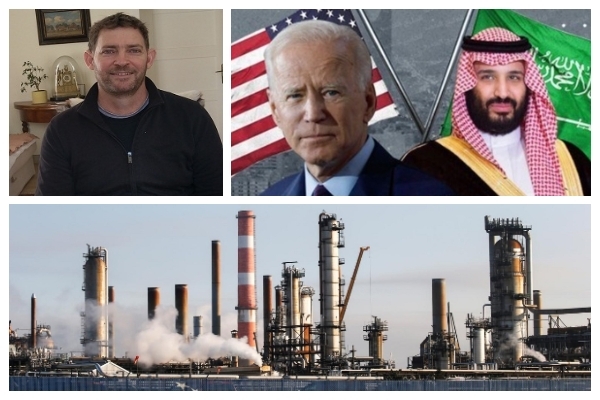Analyst Explains Biden’s ME Trip Agenda; From Israel-Saudi Normalization to Energy Market

Biden will make his first visit to the West Asian region on July 13 as the president of the United States. He is slated to visit Saudi Arabia and occupied territories during the trip. Experts believe that other than energy market, other issues such as the JCPOA and the Yemeni crisis are on the agenda of the trip.
To shed light on the issue, IQNA has reached out to Dr. Mark Furness, a senior researcher in the Inter- and Transnational Cooperation research program at the German Institute of Development and Sustainability (IDOS). His research and advisory work focusses on German and EU development policy, development cooperation with the Middle East and North Africa, policy coherence, cooperation with fragile and conflict-affected countries, peacebuilding and resilience.
He talked about the goals and effects of Joe Biden's upcoming trip to the Middle East. Here is the text of the intereview:
IQNA: In recent days, we have seen a lot of comments about the reasons for Joe Biden's future trip to Saudi Arabia. What do you think is the main reason for this trip?
Furness: It looks like the main reasons are related to geostrategic – Russia has invaded Ukraine and relations with China are tense. The trip reaffirms that Saudi Arabia is a long-term ally and strategic partner of the United States, and in the current global geopolitical climate moral objections to Saudi human rights practices are a luxury that the US feels it can’t afford.
Added to that is the fact that energy prices have been driven so high by Russia’s war. On one hand this is good for the US which will take over as a major energy supplier to Europe in the next few years, on the other high energy prices are driving inflation, which is bad for Biden’s re-election chances.
High oil and gas prices have pretty much nullified the effect of financial sanctions on Russia as well. So, even though Biden has said he won’t push for production increases there is likely to be a big discussion about how to bring energy prices back under control, not just bilaterally with the Saudis but also with the other [P]GCC members.
IQNA: Some believe that Joe Biden's government is seeking to encourage Saudi Arabia to normalize relations with Israel. How true do you think this is?
Furness: That’s a good question. CNN noted that there is some symbolism that Air Force One will fly directly from Tel Aviv to Jeddah. The UAE and Morocco have normalized relations with Israel, and apparently the Iranians are keeping a close eye on how Saudi-Israeli relations are developing. I have read that the Americans have been brokering closer Israel-Saudi ties but I can’t see a major announcement as a result of the trip.
Saudi Arabia and Israel have a pretty active behind the scenes network of ties on their core common interests anyway.
IQNA: What is Europe's view of Biden's trip to Saudi Arabia, and will the trip and possible agreements be in Europe's favor, given the ongoing war in Ukraine?
Furness: I haven’t seen any specific comments from European leaders on Biden’s trip, which is interesting considering that he called Saudi Arabia a ‘pariah’ not that long ago. I suppose Europeans see the geostrategic logic behind the trip.
Two other aspects that European governments likely appreciate are any potential for getting the Iran nuclear deal back on track, even though this is probably very small, and the continuation of the ceasefire in Yemen, which some media have attributed to MBS’ interest in making a good impression on Biden.
Of course, any outcome that reduces energy prices would be in Europe’s interest.
IQNA: Do you think that Biden's trip to Saudi Arabia could play a role in issues such as the end of the Yemeni war and the normalization of relations between Tehran and Riyadh?
Furness: I don’t see relations between Tehran and Riyadh normalizing soon, although I have heard that there has been tentative outreach recently.
The US would be happy that the Saudis and Iranians are talking, but it seems that everyone is preparing for a new regional balance where the JCPOA isn’t on the table anymore and everyone is trying to contain Iran.
With regard to Yemen, it is unlikely that the war will ‘end’ anytime soon. The conflict is on the agenda for talks in Jeddah, and some media have reported that MBS played a role in getting the ceasefire extended, which I assume must have involved some contacts with Tehran. So Biden will try to make progress on both issues but we shouldn’t expect miracles.
IQNA: Where do you think the fate of the JCPOA negotiations will ultimately lead, and what is Europe's role in the US return to the JCPOA?
Furness: The EU and European governments have been trying to get the US back to the table and they will keep doing this, because there will be no deal without the US.
The problem as I see it is that all the other players, like Saudi Arabia, Israel and also the US, don’t trust Iran and want to keep Iran ostracized and weak. In response the Iranians are not sticking to the JCPOA agreements on uranium enrichment, to which Israel responds by assassinating scientists and cyber attacks.
We have a classic security dilemma. I am no fan of Iran’s government and their regional politics, but the fact remains that as long as they perceive a threat from their neighbors and the Americans, they have every incentive to continue their nuclear program. I don’t think they can be forced to give it up, and I don’t think an aggressive containment approach by Iran’s neighbors will be effective in the long term.
Interview by Mohammad Hassan Goodarzi
The views and opinions expressed in this interview are solely those of the interviewee and do not necessarily reflect the view of International Quran News Agency.



